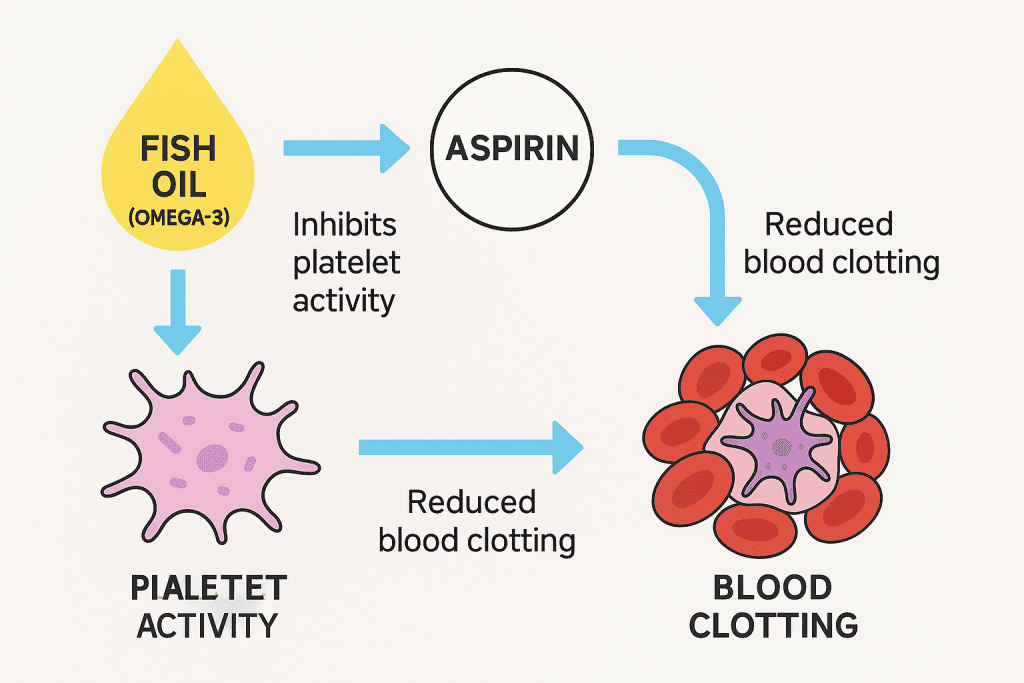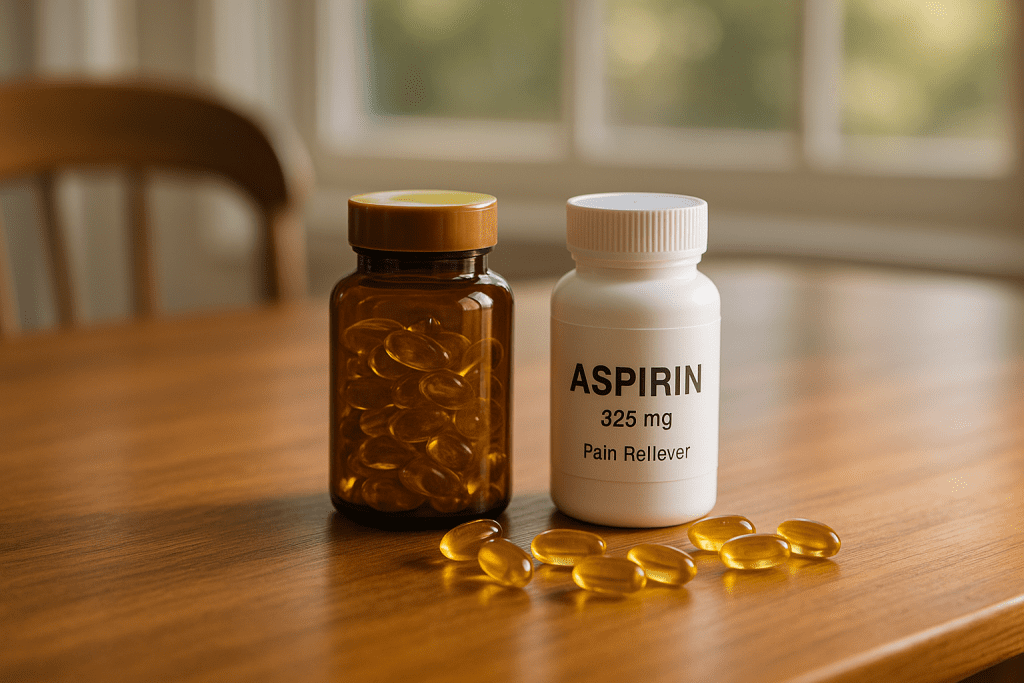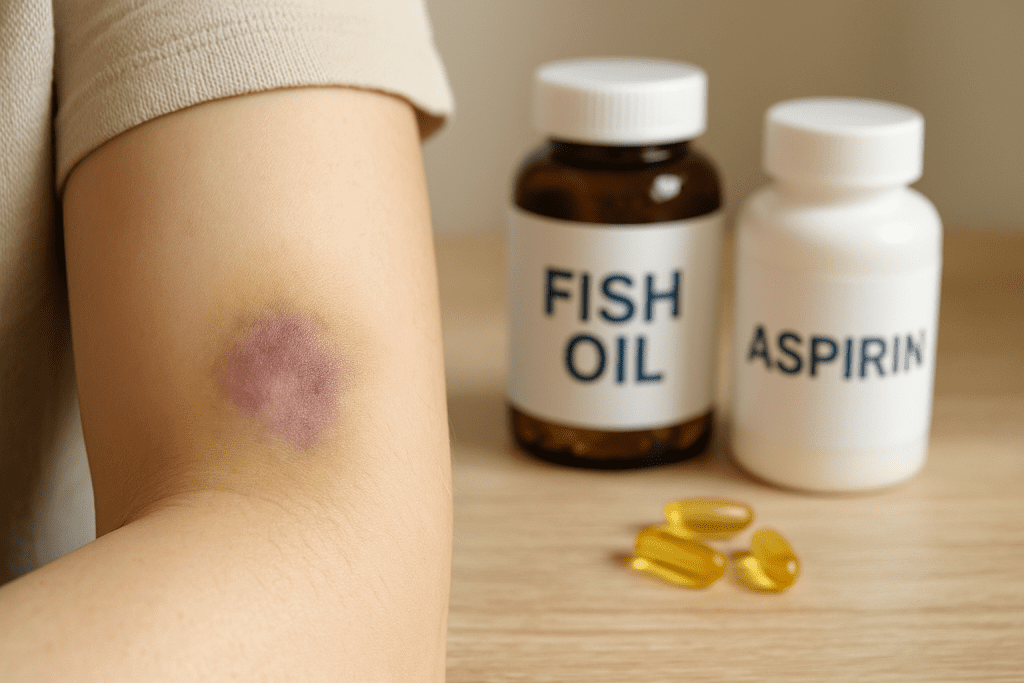
Combining fish oil and aspirin is a common strategy for heart health, but many worry it might lead to bruising or excess bleeding. This article breaks down the science behind omega-3 blood thinning synergy, what research really says about safety, and how to manage dosage to reduce risk.
If you’ve noticed easy bruising from supplements or want to understand whether this combo is right for you, keep reading – evidence offers both clarity and reassurance.
Summary: Does Combining Fish Oil and Aspirin Increase Bruising?
| Question | Answer |
|---|---|
| Can fish oil and aspirin cause easy bruising? | Possibly, but usually only at high fish oil doses or with individual sensitivity. |
| Why is there concern? | Both affect platelet function and clotting, potentially extending bleeding time. |
| What dosage is considered safe? | Up to 3g/day fish oil (EPA+DHA) with low-dose aspirin is generally safe. |
| Who should be cautious? | People with bleeding disorders, or before surgery, should consult a doctor. |
| Any signs to watch for? | Unusual bruising, prolonged bleeding, nosebleeds, or black/tarry stools. |
How Fish Oil and Aspirin Thin the Blood
Both fish oil and aspirin influence how blood clots – but through different biological pathways. Understanding these helps explain why combining them doesn’t automatically mean higher risk.
Fish Oil’s Effect on Platelets
Omega-3 fatty acids in fish oil – EPA and DHA – are known to alter platelet behavior. These fats compete with arachidonic acid in the body, shifting the production of clot-related compounds like thromboxane A2 toward those with antiplatelet activity like prostacyclin. The result? Slightly longer bleeding time and reduced clot formation in lab tests.
However, these effects are dose-dependent. Most over-the-counter supplements contain 250-1,000 mg of EPA+DHA, which is well below levels (10g+) associated with clinically significant blood thinning, according to a recent analysis in Cambridge Journals.
Aspirin’s Irreversible Action
Aspirin works by irreversibly blocking cyclooxygenase (COX-1), stopping thromboxane A2 production. Even in low doses (like the standard 81 mg “baby aspirin”), this prevents platelets from clumping together for the rest of their lifespan – around 7 to 10 days. This is why aspirin is widely used for stroke and heart attack prevention.
Combined with fish oil, the effect on platelet inhibition may appear additive. But real-world studies suggest that increased bruising is rare unless other medications or conditions are involved.
What the Research Says About Bleeding and Bruising
Concern about omega-3 blood thinning synergy is valid, but modern clinical trials paint a clearer picture: the combination is usually safe when taken in recommended doses.
Clinical Trials and Meta-Analyses
- A 2013 trial of adults with diabetes showed improved platelet response with fish oil plus aspirin vs. aspirin alone – especially in aspirin-insensitive patients.
- A 2024 meta-analysis from PubMed covering over 120,000 patients found no significant bleeding risk with standard-dose fish oil, though high-purity EPA formulations might slightly increase it (by 0.6%).
- A multinational trial in surgical patients found no excess bleeding with high-dose fish oil (up to 10g), and actually noted reduced transfusion needs in the fish oil group.
These findings suggest that the risk of easy bruising from supplements like fish oil in combination with aspirin is limited and manageable.
Real-World Context: Perioperative Safety
Traditionally, doctors recommended stopping fish oil before surgery. But recent evidence challenges this:
- A Circulation study involving over 1,500 cardiac surgery patients found no increased bleeding with fish oil – and those with the highest omega-3 levels had the lowest bleeding risk.
- Guidelines are evolving, and many surgeons now no longer require patients to stop fish oil unless on other anticoagulants or undergoing high-risk procedures.
If you’re scheduled for surgery, always let your care team know about all supplements, including fish oil.
Recommended Dosages and When to Be Careful

Safe Intake for Most Adults
Health authorities like the American Heart Association suggest:
- General health: 250–500 mg EPA+DHA/day (from fish or supplements)
- Heart disease: ~1,000 mg/day of EPA+DHA
- High triglycerides: Up to 4,000 mg/day under medical supervision
At these levels, fish oil doesn’t typically act as a significant blood thinner. A Healthline review confirmed that bleeding concerns arise only at doses above 3g/day, and even then, the risk remains low unless other blood thinners are used.
When combining with aspirin (especially the common 81 mg dose), most people tolerate fish oil well. That said, always talk to your doctor if you’re on additional medications or have a known bleeding condition.
Signs You Might Need to Adjust Your Dose
- Frequent or unexplained bruising
- Nosebleeds
- Prolonged bleeding from cuts
- Blood in stool (dark or tarry)
These could signal excessive antiplatelet activity. Consider reducing your dose and consult your provider if these signs occur.
Special Populations: When Extra Caution Is Needed

Before Surgery or Dental Work
Many still believe fish oil should be paused before procedures. But as shown in the CIRCOUTCOMES study, this may not be necessary. Still, it’s best to follow your surgeon’s protocol and share a full list of all supplements you take.
If You’re on Other Blood Thinners
Fish oil combined with aspirin is usually safe, but if you’re also on warfarin, clopidogrel, or newer anticoagulants, consult your provider. Some studies found that the triple combination didn’t raise major bleeding risk, but individual response varies.
You might also explore our guides on:
Supplement Interactions
If you’re taking multiple supplements, especially herbal ones or high-dose vitamins, be aware of stacking effects. Our certified interaction-safe multivitamins for polypharmacy offer a helpful way to simplify.
Conclusion: Fish Oil and Aspirin – A Safe Synergy for Most
Combining fish oil and aspirin rarely leads to dangerous bruising or bleeding, as long as the dosage stays within recommended ranges. For healthy adults or those with cardiovascular concerns, the benefits typically outweigh the risks – especially when guided by evidence and personalized advice.
Stick to:
- Under 3g/day of fish oil
- 81 mg/day aspirin unless otherwise directed
- Watch for signs of excessive bleeding
- Inform your doctor before surgery or starting new medications
For most, this duo supports cardiovascular health without added risk. And if you’re supplementing for prevention, remember to pair good choices with regular checkups and consistent routines.

